A year after India overtook China to become the world's most populous country, its rapid upward economic trajectory and increasing diplomatic, scientific and military weight make it an emerging superpower of ever-growing importance to the United States and the world.
Indian Prime Minister Narendra Modi addressed Newsweek's written questions and followed up with a 90-minute conversation at his official residence with Newsweek President and CEO Dev Pragad, Global Editor in Chief Nancy Cooper and Editorial Director, Asia, Danish Manzoor Bhat. Subjects covered ranged from the major economic advances made under Modi's leadership to the tension between infrastructure expansion and environmental concerns to India's relationship with China and criticism for allegedly curtailing press freedom and not bringing along the Muslims who represent some one in seven of India's population of 1.4 billion.
Here are Modi's answers, edited for space.
On the upcoming election
We have an excellent track record of fulfilling our promises. It was a big thing for the people, as they were used to promises never being fulfilled.
Our government has worked with the motto of "Sabka Saath, Sabka Vikas, Sabka Vishwas, Sabka Prayas," which means—Together, for everyone's growth, with everyone's trust and everyone's efforts.
People have the trust that if someone else has got benefits of our programs, it will also reach them. People have seen that India has raced ahead from 11th largest economy to the fifth largest economy. Now the country's aspiration is that India soon becomes the third largest economy.
By the end of the second term, even the most popular governments start losing support. Discontent toward governments has also increased in the last few years in the world. India stands out as an exception, where popular support for our government is increasing.
There is no contradiction between our physical infrastructure building and our commitment to fight climate change."
On democracy and a free press
We are a democracy, not only because our Constitution says so, but also because it is in our genes.
India is the mother of democracy. Be it Uttaramerur in Tamil Nadu, where you can find inscriptions about India's democratic values from 1100 to 1200 years ago, or speak of our scriptures which give examples of political power being exercised by broad-based consultative bodies. As the largest democracy in the world, over 600 million people voted in the General Elections in 2019. In a few months from now, over 970 million eligible voters will exercise their franchise. More than one million polling stations would be set up across India.
Constantly increasing voter participation is a big certificate for the people's faith in Indian democracy.
A democracy like India is able to move ahead and function only because there is a vibrant feedback mechanism. And our media plays an important role in this regard. We have around 1.5 lakh [150,000] registered media publications and hundreds of news channels.
There are a few people in India and in the West who have lost [connection with] the people of India—their thought processes, feelings and aspirations. These people also tend to live in their own echo chamber of alternate realities. They conflate their own dissonance with the people with dubious claims of diminishing media freedom.
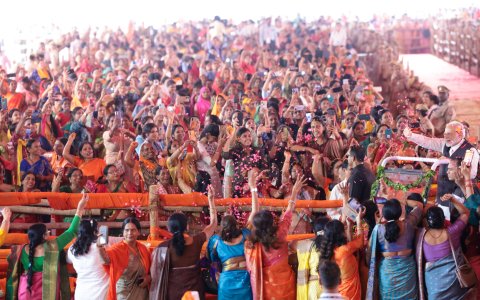
On infrastructure and the environment
The pace of India's transformation in the last decade has been accelerated by the rapid overhaul of its infrastructure.
In the last 10 years, our National Highways network increased 60 percent, from 91,287 kilometers [56,723 miles] in 2014 to 146,145 kilometers [90,810 miles] in 2023. We have more than doubled our airports, from 74 in 2014 to over 150 in 2024. Supported by our Sagarmala project, we have enhanced [the] capacity of our ports and improved the operational efficiency. We have started the tech-smart "Vande Bharat" trains for the comfort of our citizens and UDAN scheme to allow common people to fly.
Every road laid is a pathway to progress, every new airport opened provides a window to new opportunities, every railway station redeveloped energizes the local economy. We will further harness waterways. We will focus on building more metro lines across our cities to make urban transport more comfortable. We are building dedicated freight corridors for increasing efficiency of goods as well as passenger movement. Our airlines have ordered more than 1,000 planes recently, and this shows how fast our aviation infrastructure will grow.
There is no contradiction between our physical infrastructure building and our commitment to fight climate change. In fact, India offers a credible model of how to enhance physical infrastructure and yet be at the forefront of mitigating climate change: Be it lighting 10 million homes through [the] rooftop solar program or empowering farmers with solar-powered pumps, be it distributing 400 million energy-efficient bulbs and ensuring 13 million efficient streetlights or having one of the fastest adoption of EVs, be it airports or railway stations or bridges, our infrastructure is leveraging renewable energy.
Since 2014, India has massively stepped up investments in renewable energy with solar energy capacity increasing from just 2,820 MW in 2014 to over 72,000 MW now.
India is also well on its way to meet the 500 GW of renewable energy capacity and the climate commitment made in the Paris conference by 2030.
We have launched a $2.5 billion dollar National Green hydrogen mission which will contribute toward decarbonization and avert [a] further 50 MMT per annum of CO2 emissions by 2030.
We are launching 10,000 electric buses in 100 cities of India at a cost of almost $7 billion, giving a major boost to green urban mobility and reducing noise and air pollution.
India's per capita emission is already less than half of the global average. India will achieve net-zero emission by 2070 as announced.
The aim of rapid economic growth is to ensure empowerment of the poor and their social mobility."
On competing with China
India, as a democratic polity and global economic growth engine, is a natural choice for those looking to diversify their supply chains.
We have undertaken transformative economic reforms: Goods and Service Tax, corporate tax reduction, bankruptcy code, reforms in labor laws, relaxation in FDI norms. As a result, we have made significant improvement in ease of doing business. We are striving to make our regulatory framework, our taxation practices as well as our infrastructure at par with global standards.
We believe that when a country with one sixth of the world's population adopts global standards in these sectors, it will have a big positive impact on the world.
Our policies that encourage businesses and entrepreneurship, coupled with world-class infrastructure and availability of skilled talent have yielded results. We have major global manufacturing entities setting up shops in India.
We have initiated Production Linked Incentive schemes to strengthen manufacturing capabilities in India. These PLI schemes extend to 14 sectors such as electronics, solar modules, medical devices, automobiles, among others.
Given our strengths, India is now globally considered most suited for manufacturing world-class goods at competitive cost. Apart from producing for the world, the vast Indian domestic market is an added attraction. India is a perfect destination for those who want to set up trusted and resilient supply chains.
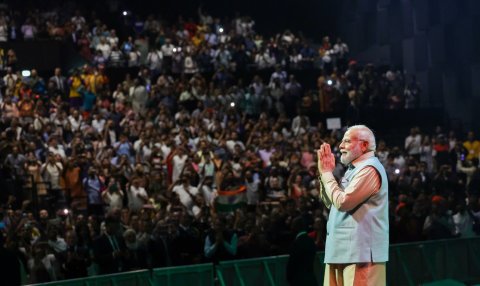
On digital payments and UPI, a Venmo-like system
I feel there are three important lessons from the success of UPI. First, technology should be open, interoperable, scalable and secure. Second, there should be democratization of technology. Third, people should be trusted to adapt quickly to technology and evolve.
UPI is a fine example of Indian innovation at its best. I see UPI as a simple tool that broke countless barriers, from financial barriers to geographical barriers. It has opened the world of digital transactions to the person at the last mile.
We have expansive economic ties with the U.S. In addition, we have a large Indian diaspora in the country, significant two-way tourist flows and over 300,000 Indian students pursuing higher education in the U.S. Given this robust connection, it would be mutually beneficial if UPI services are made available in the U.S.
Our talented people are filling skill gaps across the world.... They are acting as our ambassadors across the world."
On the challenge of sustaining and sharing economic growth
Today, India has a favorable demography. We are a young country with a median age of 28 years. We are committed to channeling this demographic dividend to transform India into a developed country by 2047.
I would not like to draw comparisons with China and Japan as each country faces unique challenges and has unique development models.
India has a unique cultural and social ethos. We have a culture of savings. There is also a unique model of family-oriented lifestyle which puts values at the center. In such a set-up, no family member is unproductive.
We are also focused on developing the full potential of our youth and also making them resilient and adaptive to future disruptions.
We are allocating a huge amount of money to facilitate long-term research in the sunrise sectors. India is venturing in areas like space, AI, green energy, semiconductors and other futuristic technologies.
The phenomenal growth of Indian startups is clearly visible. From hardly a hundred in 2014, we have over 1.25 lakh [125,000] registered startups today emerging from every corner of India. By constant skilling, reskilling and upskilling as well as becoming employment creators, our youth will ensure that they continue to lead even in the coming few decades.
For us, the aim of rapid economic growth is to ensure empowerment of the poor and their social mobility. You will be happy to know that the biggest beneficiaries of India's rapid growth in the last 10 years have been India's poor.
India has run the world's largest poverty-eradication drive in the last 10 years and has pulled 250 million people out of poverty. Only four nations in the world have a population more than that. According to a recent research paper, India has eliminated extreme poverty.
As a result of the robust economic growth, we have been able to run unprecedented welfare schemes. These welfare schemes have ensured that the poor get 40 million houses, over 100 million clean fuel connections, around 110 million clean water connections, over 110 million toilets, 500 million people get free health care and the last remaining 18 thousand villages get electricity.
These welfare measures have not only improved the standard of living for our poor but have also ensured multiple second-order effects like improving productivity, monetary and time savings and health outcomes.
Our efforts at improving social mobility have also extended to different sectors and geographies which were previously ignored. With the aspirational districts program, we have brought about a transformation in more than 100 districts which were previously termed as backward. With the vibrant villages program, we are bringing about a transformation in border villages, which were previously ignored. The eastern and northeastern part of India, which was long ignored, has seen [an] unprecedented push on infrastructure.
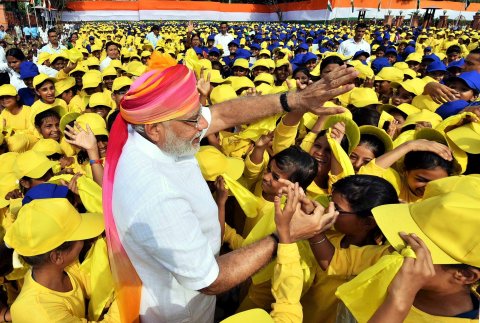
On the Indian diaspora
My association with our diaspora goes a long way back, even before I came into politics. I have been involved with our diaspora since the time I was doing social work.
In those days, I traveled extensively across the U.S. I would have traveled to around 29 states even before I became the Chief Minister of Gujarat. There used to be a scheme from Delta Airlines which offered unlimited discounted travel for a month. However, there would be no luggage allowed and no reservation of seats. I planned my travels meticulously, often using a map. I would take red-eye flights to ensure seat availability and opt for longer flights to avoid the need for hotel stays. In the morning, someone from the diaspora would pick me up, and I would spend the whole day with the community. This way, I observed them closely and got to know them well over time. I understood their potential, strengths and desires, but they lacked support and guidance.
Our diaspora has been staying abroad for a long time, often two to three generations. It is natural for the older generation to feel a special connection to their roots. They want their children to also be connected to their roots and it is also our duty to ensure that this bond remains strong. Our diaspora should feel that there is someone back home who cares about them and is there for them in any situation. Hence, we directed our efforts toward ensuring this.
Through hard work and commitment, they have earned name and fame for themselves. The success of the Indian diaspora is a global talking point today. Our talented people are filling skill gaps across the world. Whenever I go abroad, leaders of the country always have high praise for them. They are acting as our ambassadors across the world.
On religious minorities who complain of discrimination
These are usual tropes of some people who don't bother to meet people outside their bubbles. Even India's minorities don't buy this narrative anymore. Minorities from all religions, be it Muslim, Christians, Buddhist, Sikh, Jain or even a micro-minority like Parsis are living happily and thriving in India.
For the first time in our country, our government has come up with a unique saturation coverage approach when it comes to schemes and initiatives. They are not restricted for a group of people belonging to a particular community or a geography. They are meant to reach everyone, which means that they are designed in such a way that there cannot be any discrimination. Be it amenities like house, toilets, water connection or cooking fuel or be it collateral free credit or health insurance, it is reaching every citizen irrespective of his community and religion.
Women are at the forefront of India's development story today. We have changed the lexicon from women's development to women-led development."
On the status of women
Women are at the forefront of India's development story today. We have changed the lexicon from women's development to women-led development. I am happy to see you also using it.
We passed the pathbreaking legislation to provide 33 percent reservation for women in our Parliament and State legislatures. In the forthcoming general elections, we have 15 percent more women enrolled as new voters.
Maternal mortality ratio has dropped from 130 [out of 100,000 live births] in 2014 to 97 in 2020, and the nutritional status of women has significantly improved. We have among the most progressive maternity benefit laws in the world, offering fully paid leave of 26 weeks and have mandated compulsory creche [day care] facilities in any establishment with more than 50 employees.
Today, women are seeing increased participation across all sectors, including the armed forces.
We have opened 285 million bank accounts for poor women and provided collateral free loans to 300 million women entrepreneurs.
Millions of women are being benefited due to innovative schemes like Namo Drone Didi scheme, in which women are enabled to become drone operators in rural areas, and Lakhpati Didi scheme, in which 30 million women from self-help groups are being economically empowered to have annual household income of more than one lakh rupees [100,000 rupees or $1,200].
Around 15 percent of all pilots in India are women, which is the highest percentage in the world.
These progressive measures have ensured that the female labor force participation rate has increased from 23 percent in 2017 to 37 percent in 2023, despite the enormous difficulties caused due to the pandemic.
I am the first Prime Minister of India who spoke about issues like toilets and sanitary pads. I spoke about respecting women and their choices in my Independence Day address from the ramparts of the Red Fort.
Be it India, or any part of the world, we all need to keep doing more to ensure the safety of women.
On China and the Quad
The U.S., Australia, Japan, India, China: All these countries are members of many groups. We are present in different combinations in different groups. Quad is not aimed against any country. Like many other international groupings, like SCO, BRICS and others, Quad is also a group of like-minded countries working on a shared positive agenda.
The Indo-Pacific region is the engine of global trade, innovation and growth and the security of the Indo-Pacific is important not only to the region, but to the world. Through shared efforts and implementation of development projects in the Indo-Pacific in the areas of climate action, disaster management, strategic technologies, reliable supply chain, health security, maritime security and counterterrorism, the Quad countries are demonstrating their vision of a free, open and inclusive Indo-Pacific.
On the India-China border dispute
For India, the relationship with China is important and significant. It is my belief that we need to urgently address the prolonged situation on our borders so that the abnormality in our bilateral interactions can be put behind us. Stable and peaceful relations between India and China are important for not just our two countries but the entire region and world. I hope and believe that through positive and constructive bilateral engagement at the diplomatic and military levels, we will be able to restore and sustain peace and tranquility in our borders.
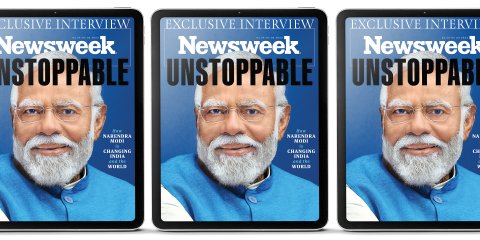
On Pakistan
I have congratulated the Prime Minister of Pakistan on taking over office. India has always advocated for advancing peace, security and prosperity in our region in an atmosphere free from terror and violence. [In relation to the imprisonment of Imran Khan], I won't comment on matters internal to Pakistan.
On criticism of ending Jammu and Kashmir's special status
I would encourage you to visit Jammu and Kashmir to witness firsthand the sweeping positive changes happening on [the] ground. Do not go by what I or others tell you. I went to Jammu and Kashmir just last month. For the first time, people have a new hope in their lives. The process of development, good governance and empowerment of the people is to be seen to be believed.
People are reaping the peace dividend: Over 21 million tourists visited Jammu and Kashmir in 2023. There has been a significant decline in terror incidents. Organized bandh/hartals [protests], stone pelting, which once disrupted normal life, are now a thing of the past
Not only this, the youth are also excited about sports events being held here. Sports is being seen as a career path for many youth there.
A new dawn has also emerged for Kashmiri women, who now enjoy the same rights as their male counterparts when it comes to inheriting property or transferring property to their children, regardless of their marital status or residency.
Post the revocation of Article 370, [which gave special status to Jammu and Kashmir] the region has become a welcoming destination for global events, hosting significant gatherings like the Formula 4 racing event, Miss World and G20 meetings. Digital economy, startups, innovation and smart solutions are taking wings.
On the significance of the temple at Ram Mandir, which Modi dedicated himself
The name of Shri Ram is imprinted on our national consciousness. His life has set the contours of thoughts and values in our civilization. His name echoes across the length and breadth of our sacred land. Therefore, during the 11-day special ritual I observed, I made a pilgrimage to the places that carry the footprints of Shri Ram. My journey that took me to various corners of the country showed the revered place Shri Ram holds within each of us.
The return of Shri Ram to his birthplace marked a historic moment of unity for the nation. It was a culmination of centuries of perseverance and sacrifice. When I was asked to be part of the ceremony, I knew I would be representing the 1.4 billion people of the country, who have waited patiently for centuries to witness Ram Lalla's return.
During the 11 days leading up to this auspicious event, I carried with me the aspirations of countless devotees, eagerly anticipating this day. The ceremony itself brought the nation together into a celebration, akin to a second Diwali. Every home was illuminated by the light of Ram Jyoti. I see it as a divine blessing that I could experience the consecration ceremony as a representative of 1.4 billion Indians.
If they [every Indian] are able to live a life of dignity, achieve their dreams, I would consider my task done."
On his legacy
I think it is not my job to think about how I will be remembered, neither does this thought motivate me.
My motivation is the impact I could make in the lives of every Indian, whom I consider my family. If they are able to live a life of dignity, achieve their dreams, I would consider my task done. But till then, I am going to work tirelessly and devotedly to fulfill the aspirations of 1.4 billion Indians.
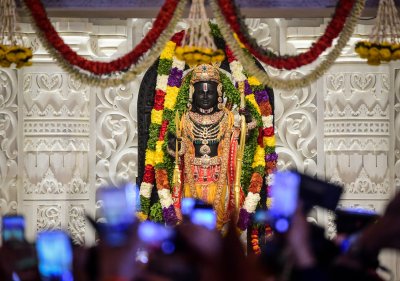
Modi on leadership
Listening is an important quality for leadership. I am god-gifted with this quality, and I have also cultivated it. Another quality that I have is that I am always in the moment. I am not distracted by phone calls, messages or anything else. When I am doing something, I am 100 percent involved and engrossed in that task.
For leaders, I feel it is important that they have a bottom-to-top feedback channel. A leader should have the ability to connect to the grassroots and get unfiltered feedback. There should also be multiple such channels of feedback, so that human biases and preferences get neutralized. I have spent at least a night in around 80 percent of India's districts. So I have direct connections almost everywhere, which helps me get direct feedback. At the same time, it is important that guidance or instructions efficiently reach from top to bottom.
Let me give you an example. When I was the Chief Minister of Gujarat, I received a call around 3 a.m. from someone in a town called Karjan. Normally, no one alerts a Chief Minister so early in the morning, but my staff knew my working style, so they alerted me. The person called to report a loud explosion in our town. He said I had come to his home for a meal in my earlier days, so he had familiarity with me and the urge to call me directly. I asked him what could be the reason. He told me that the railway line passes close to his house and it could be something related to the railways. So, I called the district administration, railway officials and my staff to inquire about the incident. None of them had heard about it, but immediately the entire administration set out to work. It turned out to be a train accident. However, because we had a head start in terms of getting timely information, we were able to react promptly. Before sunrise, we had managed the entire situation: the injured were in the hospital, and the accident site was cleared.
I am also a firm believer in delegation of work. I spend long hours understanding and discussing important matters and developing consensus. Once there is consensus, I believe in empowering people to execute it.
I didn't even know that I am good at communication. People observed this when I joined politics. So I said to myself, let's make good use of this skill.
I get hundreds of thousands of physical letters every month. I manage to check many letters and see for myself the emotions expressed by the people. It is from these letters that the thought of Mann Ki Baat [a monthly radio program] came to my mind. We have had 110 Mann Ki Baat episodes till now.
I feel negativity has a low shelf life. One needs to constantly churn out negativity for it to remain in people's minds. On the other hand, positivity is perennial. So, Mann Ki Baat is a medium for me to gain positivity from society and amplify it.

